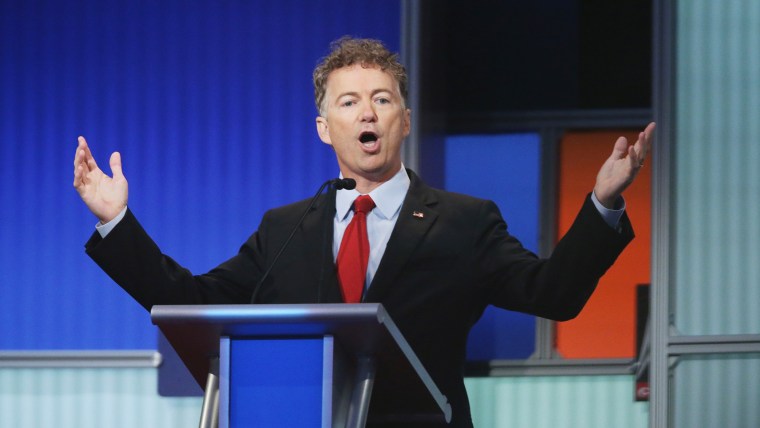WALLACE: [T]alking about the Tax Foundation and what they say. Under your plan, a family making from $50,000 to $75,000 a year would get a 3 percent rise in income. Sounds pretty good. But a family making more than $1 million a year would get a 13 percent rise in income. Question, doesn't your plan massively increase income inequality? PAUL: Well, the thing is income inequality is due to some people working harder and selling more things. If people voluntarily buy more of your stuff, you'll have more money. And it's a fallacious notion to say, 'Oh, rich people get more money back in a tax cut.' If you cut taxes 10 percent, 10 percent of $1 million is more than 10 percent of $1,000. So, obviously, people who paid more in taxes will get more back.
How Rand Paul defines 'income inequality'
For Rand Paul, some Americans "work harder," which means they have more wealth than the rest of us. No, seriously.

Sen. Rand Paul's (R-Ky.) tax plan is impossible to take seriously. The Republican presidential candidate intends to eliminate the deficit, approve trillions of dollars in new tax breaks, and impose a regressive flat-tax system, all at the same time. It'd be funny if it weren't so sad.
But the proposal isn't just arithmetically challenged. On "Fox News Sunday" yesterday, host Chris Wallace asked Paul about "fairness."
The Democratic National Committee liked the exchange so much, the party quickly posted a video of it online.
And it's not hard to understand why. Let's unwrap this a bit.
First, I don't think Rand Paul fully understands what "fallacious notion" means.
Second, and more important, is the fact that the Republican senator seems to think income inequality isn't driven by public policy, but rather, is just a natural economic occurrence. Some Americans "work harder" and sell more stuff, therefore they have more money than everyone else. See how easy it is to understand economics?
Reality paints a very different picture. Obviously, there have always been wealthier people, but income inequality has reached levels unseen in generations for a variety of quantifiable reasons -- related to economics, taxes, labor policy, etc. -- that have literally nothing to do with "some people working harder."
Paul no doubt finds his version of reality ideologically satisfying, but it's also ridiculous. By his reasoning, as David Atkins noted yesterday at the Washington Monthly, when economic inequality was less severe a generation ago, the elites must have been lazier: "Does Rand Paul believe that the rich just didn't work as hard in 1940 or 1970? Does he have a theory on why the problem is so much worse today than it used to be?"
And finally, the GOP presidential hopeful remains committed to the idea that economic vitality is built on a foundation of giving rich people tax breaks, which will eventually lead to prosperity trickling down to everyone else. The failure of this model in practice has apparently done little to shake Rand Paul's confidence in the theory.
My follow-up question for the senator is straightforward enough: after President Obama raised taxes on the wealthy, U.S. job creation reached a 15-year high. How do you explain that?